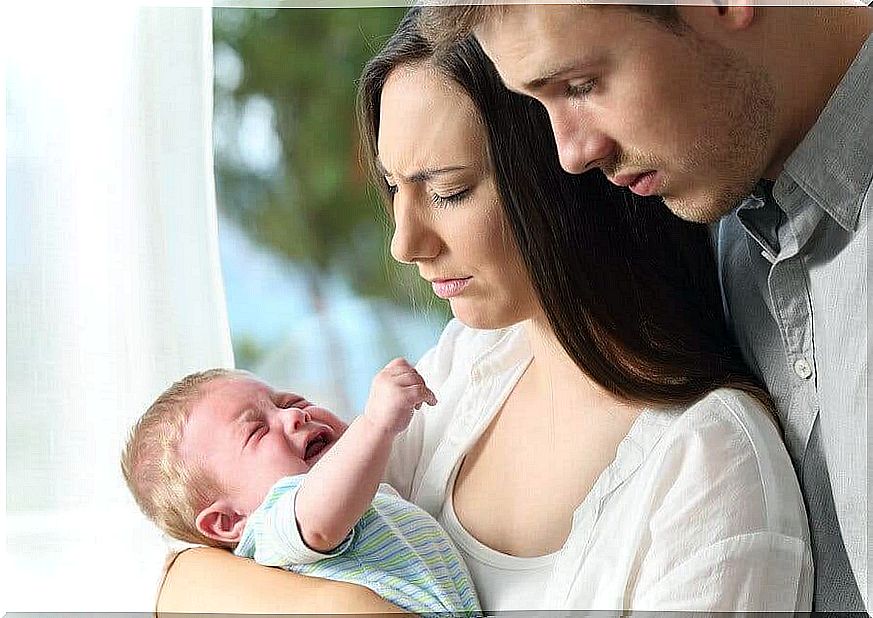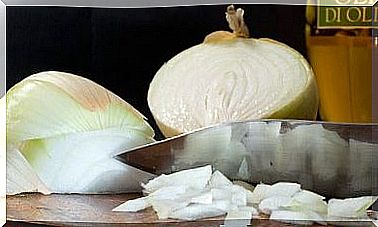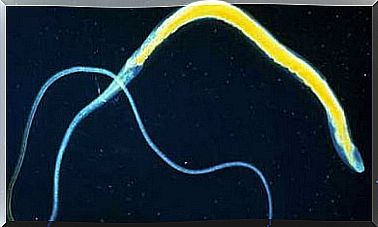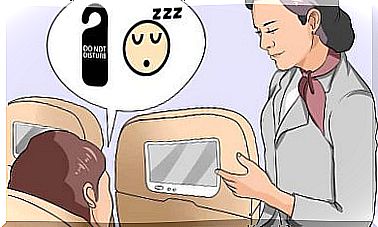Infant Colic: Causes And Tips For Parents

Some of the main reasons for seeing a pediatrician are usually those related to the baby’s sleep, feeding, breastfeeding and infant colic. Today we are going to deal with the latter, as it often causes anxiety and confusion in parents.
The most widely held definition of infant colic describes it as episodes of intense, vigorous crying for at least three hours a day, three days a week for at least three weeks in a healthy, well-fed baby.
Most of the time they appear up to six weeks of life, and crying spells are described as sudden attacks of high intensity that appear at the end of the day. Improvement appears around four or six months postpartum.
How are these crises?
The characteristic is that babies adopt a very typical position : they position themselves with their thighs flexed in the abdomen, clench their fists, the face becomes reddened and the abdomen is very tense.
These episodes can last anywhere from a few minutes to hours. In the periods between attacks, babies are completely asymptomatic and smiling and, during follow-up, they breastfeed and gain weight normally.

Causes of Infant Colic
The causes of infant colic are multifactorial, that is, there is no single cause that causes it, and there are often several factors that make a given baby more susceptible to them:
- Organic factors: immaturity of the digestive system, intolerance to milk protein, etc.
- Behavioral factors: baby’s temperament, behavior at home (first-time parents), use of nipples, type of lactation, suction deficit, etc.
- Anatomical factors: presence of lingual frenulum, change in the palate, low weight, etc.
What can we do?
The first thing we have to say to reassure parents is that this is a benign process for which there are no universal remedies.
The main thing to do is to comfort our babies and take care of their crying, that always, because letting them cry not only won’t make the colic go down, but it can also cause other physical and psychological complications for the little one.
Faced with crying, we must discard logical causes: that he is hungry, cold, hot, sleepy, with a dirty diaper, etc. It is true that, over the weeks, parents are able to identify the type of baby crying and, based on that, they know how to cover the needs they have.
We should rule out any pathology or illness, such as earache or gum pain. Therefore, it is important to see a pediatrician when we realize that the baby may have some kind of pain.
If, from a medical point of view, the baby is healthy, but we suspect he is suffering from infant colic, it is important to look for a specialized center with a multidisciplinary team.
What is an infant colic consultation like?
This problem can be approached in a multidisciplinary way and, therefore, the specialist physician, the pediatric nurse, the physiotherapist and, when necessary, the psychologist collaborate.
The first thing that will be done is the survey of the birth history, pregnancy, the first days of life and also the family history. Then, the baby’s physical examination begins: abdomen, diaphragm, oral cavity, signs of atopic dermatitis, etc.
In the same consultation, the baby’s feeding from the breast or bottle is analyzed in order to rule out adherence problems, since, in many occasions, these are a common reason for the baby to swallow air. In these cases, treatment with physiotherapy or osteopathy is carried out, and then the parents are instructed on how to act at home.

Tips for parents:
- Offer the breast until the baby spontaneously picks it up. Avoid using artificial nozzles, which can cause nozzle confusion. We have to ensure that the suction technique is correct and that there is no lingual frenulum for a correct tongue mobility to occur.
- If you bottle-feed, it is important that the technique is also correct. Make sure it doesn’t cause any changes in the mouth. We can choose an anti-colic bottle, which regulates the flow of milk, and offer specific formulas for babies with food allergies.
- It is important that, after feeding, we keep the baby in an upright position so that he can expel all the air.
- When breastfeeding and suspecting that the baby has food intolerances or allergies, the mother should remove from her own diet: dairy products, gluten, eggs, oilseeds, soy or fish for two or three weeks to see any improvement. If there is a relationship between these foods and the baby’s allergy, a somewhat restrictive diet should be maintained and, if there is no improvement, all the foods we advise to remove can be reintroduced.
- Massage for babies, performed by parents or caregivers, or by a physiotherapist specializing in infantile colic.
- Always attend to the baby’s cry.
- Promote skin-to-skin contact. This technique has been proven to make babies cry less. Also, use a sling. This way, you ensure the correct position of the baby that will help to expel gas and will also be able to immediately meet your needs.
- Slightly tilt the head of the crib.









